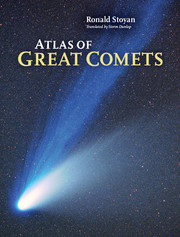Book contents
- Frontmatter
- Dedication
- Foreword
- Contents
- Using this book
- Introduction
- Cometary beliefs and fears
- Comets in art
- Comets in literature and poetry
- Comets in science
- Comet science today
- Great comets in antiquity
- Great comets in the Middle Ages
- Great Comets
- Appendix
- Glossary
- References
- Index
- Figure credits
Comets in literature and poetry
from Introduction
Published online by Cambridge University Press: 18 December 2014
- Frontmatter
- Dedication
- Foreword
- Contents
- Using this book
- Introduction
- Cometary beliefs and fears
- Comets in art
- Comets in literature and poetry
- Comets in science
- Comet science today
- Great comets in antiquity
- Great comets in the Middle Ages
- Great Comets
- Appendix
- Glossary
- References
- Index
- Figure credits
Summary
Just as in art, for a long time the comet motif in literature was bound up with negative astrological meaning. Only with the Enlightenment did it become possible to employ comets in a metaphorical sense in other contexts. Since the second half of the nineteenth century, comets have been a central motif in science fiction.
Early modern times
“When beggars die there are no comets seen / the heavens themselves blaze forth the death of princes.” This famous verse from the second act of Shakespeare's tragedy ‘Julius Caesar’ dates from 1599. Shakespeare compressed the entire literary role of comets into one sentence, which he put into the mouth of Calpurnia, Caesar's wife. The statement is quite in accord with the ancient astrological interpretation.
Until well into the eighteenth century, it was no different in German-speaking countries. Among many similar tales, the ‘Kometspiegel’ (‘Comet mirror’) of Thomas Hartmann, written in Halle in 1606, has become famous, and which, in a mixture of Christian fear of comets and astrological interpretation, lists the threats to mankind posed by a comet:
“All comets indeed give evidence / of a lot of bad luck, affliction, peril and danger / and a comet never appears / to be cares without evil meaning / in general eight kinds of affliction occur / when a comet burns in the air:
Much fever, illness, pestilence and death,
Difficult times, shortages and famine,
Great heat, droughts and infertility,
War, rapine, fires, murder, riots, envy, hatred and strife,
Frost, cold, storms, weather and lack of water,
Great increase in people going into decline and death,
Conflagrations and earthquakes in many places,
Great changes in government.
But for us to do penance from the heart, God afflicts us with disasters and pains.”
The Enlightenment and Romanticism
About the middle of the eighteenth century, in parallel with the scientific revelations about comets, the literary point of view also changed. Authors during the Enlightenment discovered comets as an ideal motif.
- Type
- Chapter
- Information
- Atlas of Great Comets , pp. 26Publisher: Cambridge University PressPrint publication year: 2015

